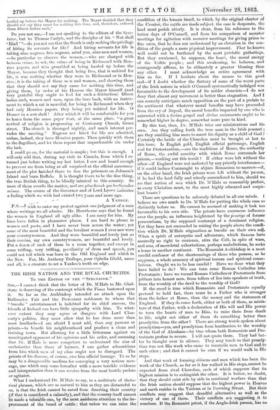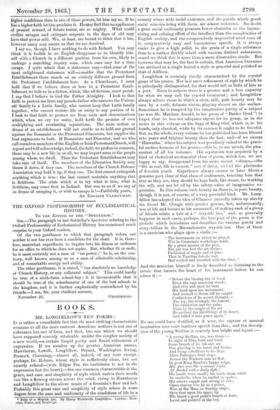THE IRISH NATION AND THE RIVAL CHURCHES. To THE EDITOR
OF THE "SPECTATOR."
SIR,—I cannot think that the letter of Dr. M'Hale to Mr. Glad- stone is deserving of the contempt which the Times bestowed upon it. So far as the Archbishop intended an attack upon the Ballinaaloe Fair and the Protestant nobleman to whom that " bucolic " entertainment is indebted for its chief success, the friends of Ireland can have little sympathy with him. To what- ever extent they may agree or disagree with Lord Clan- carty's politics, they must allow that he has done more than most landlords—I am afraid I must add, than any parsons or priests—to benefit his neighbourhood and produce a clean and thriving town. But allowing for a little bitterness against an unmitigated opponent of his opinions and his order, and assuming that Dr. M'Hale is more competent to understand the sins of ecclesiastics than those of laymen, I can gather admonitions from him which men of my class ought not to disregard. The priests of his diocese, of course, owe him official homage. To us he may be a disagreeable medium for conveying a very serious mes- sage, one which may come hereafter with a more terrible evidence and interpretation than it can receive from the most hostile prelate or agitator.
What I understand Dr. M'Hale to say, in a multitude of rheto- rical phrases, which are as natural to him as they are distasteful to us, is that the Irish cannot be saved from deserting their country (if that is considered a calamity), and that the country itself cannot be made a tolerable one, by the most assiduous attention to the im- provement of the breed of cattle ; that unless we can raise the
condition of the human breed, to which, by the original charter ot the Creator, the cattle are Made subject, the case is desperate, the land must perish utterly. It is clear, from his reference to the better days of O'Connell, and from his comparison of monster meetings for agitation with monster meetings for giving prizes to fine mien, that he does not understand by an elevation in the con- dition of the people a mere physical improvement. That he knows well could not be furthered by the most patriotic gatherings. But they awakened, he supposes, the heart, the moral energy of the Celtic people ; and this awakening, he believes, and courageously affirms, to be ultimately a greater blessing than any other. I must acknowledge an entire agreement with
him so far. If I hesitate about the means to this good end—if I doubt whether the flattery of some of the worst parts of the Irish nature in which O'Connell systematically indulged was favourable to the development of its nobler elements—I do not deny that almost any movement is better than stagnation. And I can scarcely anticipate much opposition on the part of a prelate to the sentiment that whatever moral benefits may have proceeded from the cry of Repeal, the moral benefits imparted by one who is entrusted with a divine gospel and divine sacraments ought to be somewhat higher in degree, somewhat more pure in kind.
By this test, then, Dr. M'Hale tries our ministrations and his own. Are they calling forth the true man in the Irish peasant ; are they enabling him more to assert his dignity as a child of God ? Certainly the battle of the Churches must be brought at last te this issue. Is English gold, English official patronage, English zeal for Protestantism,—are the traditions of Rome, the authority of Rome, the awful sanctity with which Rome surrounds her priests,—working out this result ? It either were left without the other—it England were not molested by any priestly interference— if it could induce Connaught to abjure Romanism to-morrow—if, on the other hand, the Irish priests were left without the parson, if he had the land fully and utterly surrendered to him, should we see that nation of men which Dr. M'Hale so reasonably prefers, 'SS every Christian must, to the most highly educated and corpu- lent beasts ?
These are questions to be solemnly debated in all our minds. I believe we owe much to Dr. M'Hale for putting the whole case so distinctly before us. He cannot be accused of making it look too favourable to his own side. The priests have enormous influence over the people, an influence heightened by the prestige of former persecutions, by the supposed contempt of a dominant religion. Yet they have not succeeded in raising the people above the condi- tion which Dr. M'Hale stigmatizes as bucolic on their own adj. When a spirit of enterprise and adventure, which Saxons have assuredly no right to contemn, stirs the Celt, in spite of wars, and seas, of sacerdotal exhortations, perhaps maledictions, he seeks a home in another continent. The Romanist Archbishop is a most candid confessor of the shortcomings Of those who possess, as he supposes, a whole armoury of spiritual terrors and spiritual conso- lations. Ought we to be less candid? Have we done what they have failed to do? We can turn some Roman Catholics into Protestants ; have we turned Roman Catholics or Protestants from jobbers into honest men, from tellers of lies into speakers of truth, from the worship of the devil to the worship of God?
If the creed is true which Romanists and Protestants equally pretend to hold fast, there must be a Father who is stronger than the father at Rome, than the money and the statesmen of England. If they do come forth, either or both of them, as minis- ters of that Father, with a declaration of His will and His power to turn the hearts of men to Him, to raise them from death to life, might not either of them do something better than proselytize from the other? There are strong words spoken about proselytism—yes, and proselytism from heathenism to the worship of the God of Abraham—by One whom both Romanists and Pro- testants profess to revere. I will not quote them. They had bet- ter be thought over in silence. They may teach us that prosely- tism was not His work who came to reconcile men to God and to each other ; and that it cannot be ours if we would walk in His steps. And that work of forming citizens and men which has been the work of the Church, so far as it has walked in His steps, cannot be expected from rival Churches, each of which supposes that its highest mission is to extinguish the other. It is better, no doubt, that they should exist side by side in continual warfare than that the Irish nation should suppose that the highest power in Heaven and earth resides in the Vatican or in Downing Street. But their conflicts may suggest that dreadful alternative as well as the victory of one of them. Their conflicts are suggesting it to numbers. If the Romanist priest, if the Anglo-Irish parson, has no higher confidence than in one of these powers, let him say so. If he has a higher faith let him proclaim it. Henley find that no appliances Of present reward, of future terror, are so mighty. What could civilize savages and extirpate serpents in the days of old may have that power still. We, at least, are bound to think that it has, however Many may assure us that we are deceived.
I say we, though I have nothing to do with iieland. You may think it is foolish in an English clergyman so to identify him- self with a Church in a different position from his own, likely to undergo a searching inquiry soon, which ours may for a time escape.. I quite admit that a statesman may—that some of the Most enlightened statesmen will—consider that the Protestant Establishment there stands on an entirely different ground from the Protestant Establishment here. As a Churchman, I must bold that if we believe there or here in a Protestant Estab- lishment we believe in a fiction, which, like all fictions, must perish. i thy that I believe in God the Father Almighty. I look to that faith to protect me from any pseudo-father who narrows the Univer- sal family to a Latin family, who cannot keep that Latin family together, Who cannot restore life or unity to any portion of it. look to that faith to protect me from sects and denominations which, when we cry for unity, hold forth the promise of ever Multiplying and everlasting separations. The mere notion or dream of an establishment will not enable us to hold our ground against the Romanist or the Protestant Dissenters, but supplies the best arguments to -both. If Romanists and Dissenter, and we who call ourselves members of the English or Irish Protestant Church, will rejamit and will acknowledge, indeed, the faith we profess in common, there may be a new life in us all, we may impart some to the people among WhOm we dwell. Then the Protestant Establishment may lake care of itself. The members of the Liberation Society may throw it dOvirt, if they can. The members of the Church Defence Association May hold it up, if they can. The first cannot extinguish anything which is true ; the last cannot maintain anything that is fictitious. The crisis which is to try what is true, what is fictitious, may come first in Ireland. But woe to us if we any of us dream Of escaping it, or wish to escape it !—Faithfully yours,
AN ENGLISH CLERGYMAN.































 Previous page
Previous page